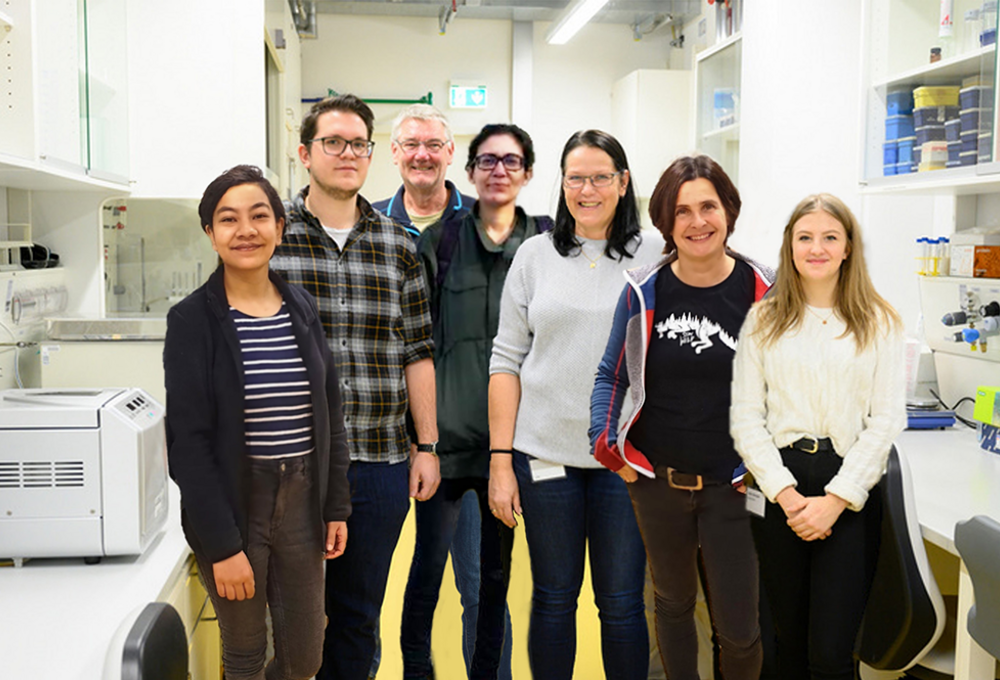- The University
- Studying
-
Research
- Profile
- Infrastructure
- Cooperations
- Services
-
Career
- Med Uni Graz as an Employer
- Educational Opportunities
- Work Environment
- Job openings
-
Diagnostics
- Patients
- Referring physicians
-
Health Topics
- Health Infrastructure
Research team Sattler
Research focus: Metabolism
PI: Wolfgang Sattler
Focus: Most regions of the brain operate within a well-controlled environment that is separated from the peripheral circulation by the neurovascular unit (NVU). The NVU is a dynamic entity that responds to extra- and intracerebral inflammatory signals. We focus on (neuro)inflammatory events that generate modified lipids and/or lipoproteins and study their downstream signaling pathways in cells that communicate at the NVU. We utilize cell lines, primary cells, tissue culture, and animal models combined with biochemical/analytical techniques to address these questions. Our goal is to understand associations between lipid-mediated inflammatory signaling networks, cerebrovascular dysfunction, and the development of neurodegenerative diseases.
Vernetzung: We work in close cooperation with other research groups at the Division of Molecular Biology and Biochemistry (Wolfgang Graier, Dagmar Kratky, Tobias Madl und Roland Malli).
Projects
Lysophosphatidic acid as effector of microglia function
- In this project we test the hypothesis that LPA-mediated signaling cascades determine cell fate decisions and effector functions of microglia via modulation of metabolic pathway activity. This will extend findings from peripheral immune cells to the endogenous brain defense and immune system. We characterize LPA-induced metabolic signatures of microglia and study the underlying signaling events leading to metabolic reprogramming. We investigate whether specific LPA-induced metabolic programs are associated with distinct cytokine secretion patterns that determine neurotoxic properties of microglia in disease.
- Duration: 2017-2021
- Funded by: FWF, Med Uni Graz
- Project partners: Wolfgang Graier, Tobias Madl, Roland Malli
Pathophysiological effects of myeloperoxidase-derived chlorinated lipids
- In this project we test whether endotoxemia increases MPO-dependent lipid oxidation/modification in the mouse heart. In vivo we study the effect of endotoxemia on the formation of chlorinated lipids in mouse heart. In vitro we investigate redox metabolism of 2-chlorohexadecanal (2-ClHDA) by a cardiomyocyte cell line (HL-1). To identify proteins that are subject to electrophile damage by 2-ClHDA we use Huisgen 1,3-dipolar cycloaddition of fluorophores and two dimensional-gel electrophoresis and subsequent LC-MS/MS analyses to identify covalently modified proteins.
- Duration: 2017-2021
- Funded by: FWF, Med Uni Graz
- Project partners: Heinz Hammer, Manfred Kollroser, Dagmar Kratky, Ernst Malle, Barbara Rainer, Ernst Rechberger
Division of Molecular Biology and Biochemistry
Team
Members
- Bernhart Eva Maria
- Joshi Lisha
- Klampfer Celina
- Plastira Ioanna
- Prasch Jürgen
- Reicher Helga




